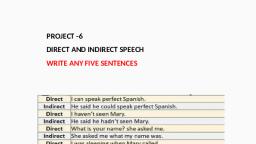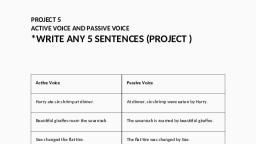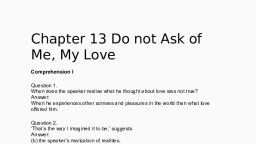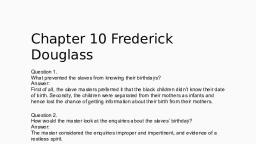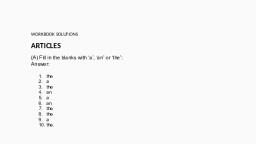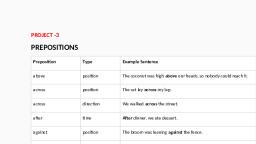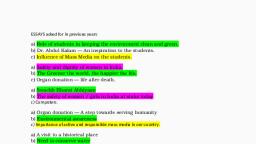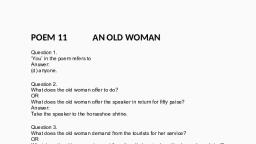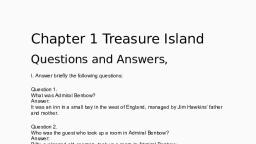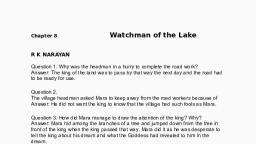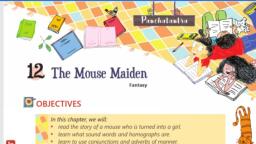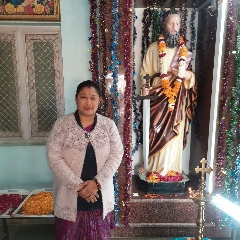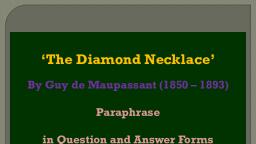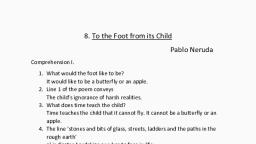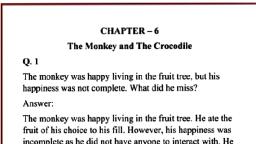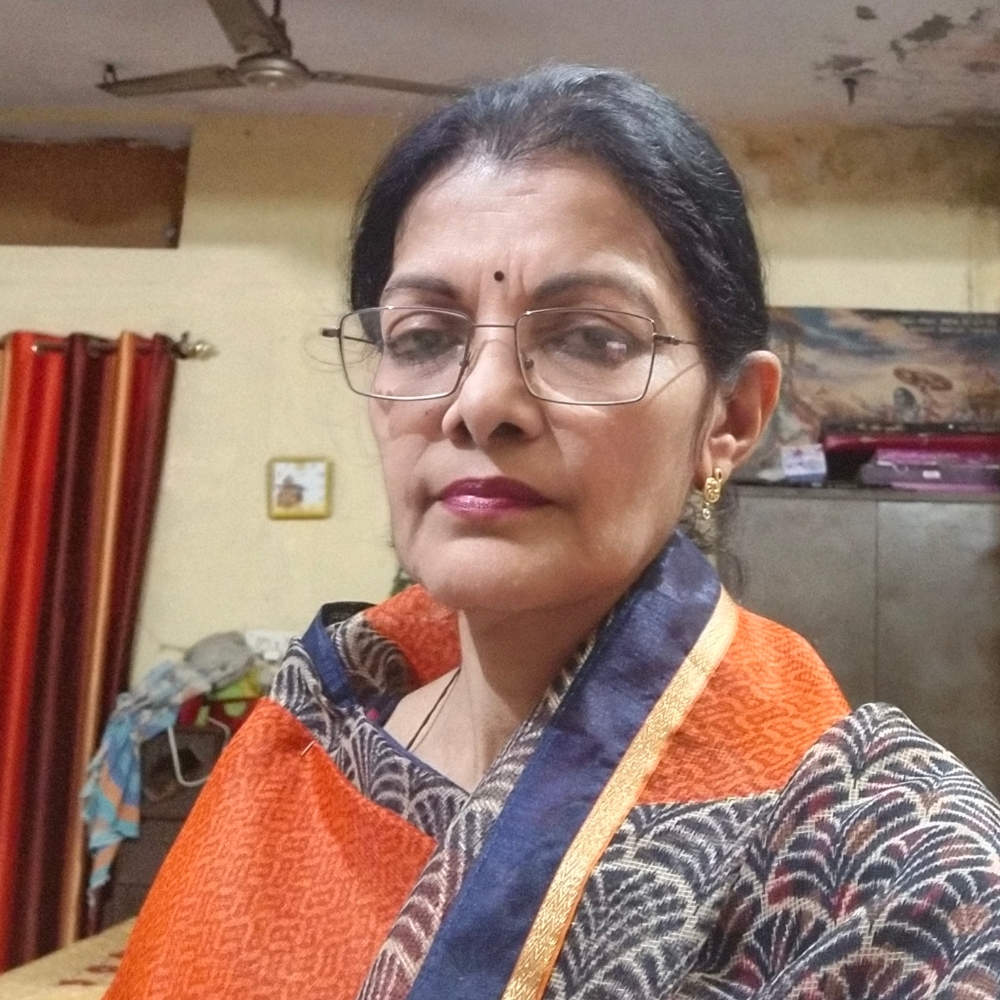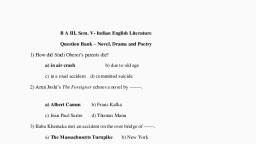Page 1 :
POEM -9, , THE FARMER’S WIFE, , Questions and Answers, Question 1., Who do ‘you’ and ‘I’ in the poem refer to?, Answer:, ‘You’ refers to the farmer and ‘I’ refers to the farmer’s wife. ., Question 2., Why has the speaker’s husband committed suicide?, OR, Why did the farmer commit suicide?, Answer:, The farmer was in debt and had no crops to sell. He was unable to bear the shame, and was unwilling to stretch his hand for help. Being hounded by creditors he, committed suicide., Question 3., What series of contrasts does the speaker draw between herself and her husband?, Answer:, The speaker says that her husband was virtuous, but she is a sinner, and he is dead, while she is alive. There is irony in this series of contrasts because the farmer,, unable to bear the shame, committed suicide without wondering what would be the, plight of his wife, left behind to face the creditors., Question 4., What expressions in the poem bring out the contrast between the speaker and her, husband’s plight? What difference does this indicate?, Answer:, Being a man, the farmer was not used to being subservient to others. He could not, bear the idea of bending his head or stretching his hand in front of the creditors. But,, being a woman, the farmer’s wife was used to obedience and harsh treatment and, could pull on even when insulted and deprived. Moreover, being a woman, her, motherly instinct made it impossible for her to leave her children behind at the mercy, of fate. Though the prospect of bringing up four children in the face of stark poverty, is daunting, she faces the challenge and doesn’t take recourse to the easier escape, route of suicide. Thus we see that the difference between the man and the woman, lies in the way men and women are generally treated in society and the way in which, men treat women at home. But the saving grace is the fact that the injustice meted, out to women in society and at home makes them strong and gives them the, courage to ’embrace life and struggle for life’., Question 5., The farmer’s wife in the poem is, (a) complaining about her husband’s death., (b) lamenting the death of her husband., (c) angry that her husband has left her.
Page 2 :
(d) bitter about her husband’s act., (e) worried about her future., (f) all of the above., Answer:, (f) all of the above., Question 6., What memories of her husband trouble her now?, OR, How does the farmer’s wife lament over the death of her husband?, OR, What are the memories of her husband that haunt the farmer’s wife?, Answer:, The woman was ill-treated by her husband in his drunken state. He had abused her, both physically and verbally when he was alive. But all this was accepted by the, woman because society had made her believe that a man had the right to rule over, his wife and even abuse her when displeased as he was the master who went out, into the world while she was to deal with family problems. But this idea of the man, gets beaten when the farmer is unable to withstand the pressure and commits, suicide. Now, the woman has to shoulder the responsibility of both work and home., Naturally, the woman has all negative memories of the man who did no justice to her, when alive and did a greater injustice to her by embracing death. The poet wants to, point out that while all of us sympathise with the man who was driven to commit, suicide, the plight of the woman who has to fend for herself is worse than that of the, man who is dead and thereby free of all problems., Question 7., What does the phrase ‘harvest of my womb’ suggest? Why is their plight compared, to ‘worm-eaten cotton pod’?, Answer:, The phrase ‘harvest of my womb’ refers to the four children the woman has borne., Just as the field produces the crop and has the harvest, the woman has produced, children. If she, like her husband, takes the easier way out by committing suicide, the, children will be left behind like the ‘worm-eaten cotton pod.’ The woman makes it, clear that if the children do not have the parent figure to nourish them they would be, like the unripe cotton pods. They cannot reach their mature stage of growth. The, poet deliberately uses the simile which compares the orphaned children to wormeaten cotton pod because it was in cotton-growing areas that the highest number of, farmers committed suicide., Question 8., To what condition had her husband’s act of committing suicide pushed her?, Answer:, Her husband’s act of committing suicide has pushed her to a state which is worse, than death. The woman uses the word ‘death blow’ to show that the death blow of, poison which put an end to the farmer’s life is easier than the death blow that the, wife has to experience in terms of money, dignity and complexity of bringing up the, children without any support.
Page 3 :
Question 9., The poem ends with, Answer:, (c) a will to survive against all odds., II Question 1., Many times the tone suggests the attitude of the speaker. What kind of attitudes are, suggested by the words ‘virtuous’, ‘poor sinner’, ‘he is but a man’, ‘what of this?’,, Why is this?’, Answer:, The attitude of the speaker is cynical. She cannot accept her husband’s act of, cowardice. She uses the word ‘virtuous’ ironically. She mocks at the possibility of all, praising the farmer as a man of dignity who couldn’t bear the idea of taking loans, from others. It is customary for all of us to praise the dead and so the farmer would, get nothing but sympathy. However, the speaker considers his act cowardly. She, says ironically that she will be taken as a ‘poor sinner’ because she is still alive when, her virtuous husband has become a martyr., She is justifiably angry that the ‘man’ of the house has turned out to be a coward., The man who abused her because of his advantage of being ‘but a man’ in a, patriarchal society, has left her behind to do the work of a man, that is, earning a, living for the sake of the four children. The woman rightly points out that the farmer, should have had the strength of character to ask the questions, ‘What of this?’ and, ‘Why is this?’ and fought against the odds in life to come out of difficulty. But he, showed no such courage and left his family behind in dire straits to fend for, themselves., Question 2., What kind of questions does the poem raise about the plight of farmers’ widows? Do, you think that these questions are only addressed to the speaker’s dead husband?, Answer:, The poem ‘The Farmer’s Wife’ by the Volga takes up the contemporary problem of, many a farmer committing suicide unable to repay the debt taken. It takes a, refreshingly different angle of perceiving the problem from the farmer’s wife’s angle., The poem is an eye-opener because generally when we hear or read about the acts, of suicide, we think only about the tragic plight of the farmer who was pushed into, the act of committing suicide., While it is true that the state of the farmer deserves our sympathy, it is equally true, that not many of us view the problem from the angle of the family that is left behind., The fact remains that the family would continue to be in the state of insolvency and, such a family would be in the worst state of affairs because the so-called ‘man of the, house’ is dead and the family still has no source of income. The widow of the farmer, or any other person who is left behind to shoulder the onus is in a very pitiable, condition indeed! Hence, the aim of the poem is not to single out one case of suicide,, but to throw light on a social problem which needs government intervention to be, resolved.
Page 4 :
On the one hand, the poem is a plea to all those who give up their struggle not to do, so and to brave the storm courageously, and on the other hand, it is a tribute to the, women who show greater forbearance than men in facing difficulty and in tackling, problems. The poem also mocks at the idea of a man as the breadwinner and his, sense of superiority over the woman he takes for a wife. The poem, at yet another, level, is an appeal to the government and perhaps even social organisations to, support those people who want to live with dignity but are forced to eat dirt.

